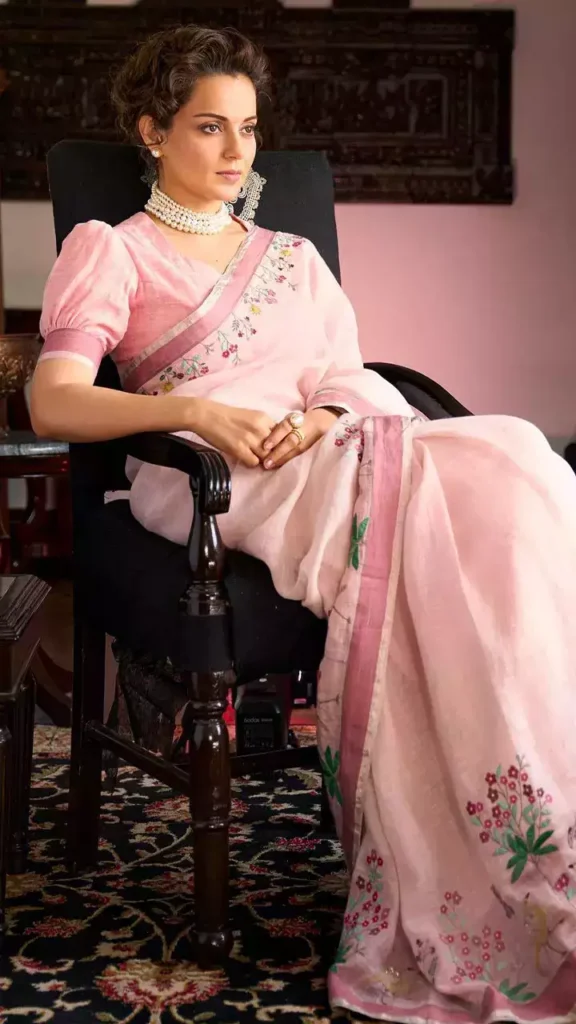Kangana Ranaut Supports Eknath Shinde Amid Controversy

Ranaut’s Defense of Eknath Shinde
On Thursday, BJP MP and actor Kangana Ranaut expressed her support for Maharashtra Chief Minister Eknath Shinde following remarks made by Swami Avimukteshwaranand Saraswati, the Shankaracharya of Jyotirmath, who labeled Uddhav Thackeray a “victim of betrayal.” The Shankaracharya’s comments implied that Shinde was a “traitor” and a “betrayer,” which sparked controversy.
In a strong rebuttal, Ranaut criticized Swami Avimukteshwaranand for his remarks, stating that he had “hurt the sentiments of all” by using such terms against Shinde. She argued that labeling Shinde in such a negative manner was disrespectful and unwarranted. Ranaut’s defense of Shinde underscores her alignment with the current Chief Minister and her disapproval of those who criticize his leadership.
Political Discourse in Maharashtra
Ranaut’s comments add to the ongoing political discourse in Maharashtra, highlighting the tension between supporters of Eknath Shinde and those loyal to Uddhav Thackeray. By openly supporting Shinde and condemning Shankaracharya’s remarks, Ranaut has positioned herself firmly in the camp backing the current Chief Minister, further fueling the debate on loyalty and betrayal within the state’s political landscape.
Shankaracharya’s Clarification
The Shankaracharya, who declined the invitation to the Ram temple consecration ceremony in Ayodhya, clarified that his remarks were not political. “Uddhav Thackeray has been betrayed, and many people are anguished by it. I met him today at his request and told him that people’s pain won’t subside until he becomes the chief minister again,” he told reporters.
He further explained, “The one who betrays can’t be a Hindu. The one who tolerates betrayal is a Hindu. The entire populace of Maharashtra is anguished by the betrayal, and this was reflected in the recent Lok Sabha elections.”

The collapse of the Maha Vikas Aghadi Government
The Maha Vikas Aghadi (MVA) government, led by Uddhav Thackeray, collapsed in June 2022 after Eknath Shinde rebelled and split the Shiv Sena. Shinde then formed a new government in alliance with the BJP, ultimately becoming the Chief Minister of Maharashtra. This political upheaval has left lasting wounds among Shiv Sena loyalists and broader segments of the public who supported Thackeray.
Kangana Ranaut’s Critique
Kangana Ranaut continued her defense of Shinde and criticized Swami Avimukteshwaranand’s comments. “In politics, alliances, treaties, and the division of parties are normal and constitutional. The Congress Party split in 1907 and again in 1971. If a politician doesn’t engage in politics, what should he do, sell golgappas?” Ranaut said in a post on X.
She added, “Religion also dictates that if a king exploits his subjects, then treason becomes the ultimate duty.” Ranaut, the Mandi MP, accused Swami Avimukteshwaranand of insulting Hinduism with his “petty” remarks. “Shankaracharya ji has misused his words and influence. By calling Maharashtra Chief Minister Eknath Shinde a traitor and a betrayer, he has hurt our sentiments,” the BJP leader remarked.
Impact on Public Opinion
Ranaut’s comments and Swami Avimukteshwaranand’s statements reflect the deepening political and social rifts in Maharashtra. Shinde’s rebellion and subsequent rise to power have left lasting wounds among Shiv Sena loyalists and broader segments of the public who supported Thackeray. As the political drama unfolds, the remarks by prominent figures like Ranaut and Shankaracharya continue to shape the narrative and influence public opinion in the state.
The Political Landscape in Maharashtra
The political landscape in Maharashtra is characterized by deep-seated loyalties and intense rivalries. The split within the Shiv Sena, a party with a strong regional identity and deep-rooted connections to the state’s political fabric, has created a significant realignment of political forces. Eknath Shinde’s rebellion against Uddhav Thackeray, leading to the collapse of the MVA government, marked a pivotal moment in Maharashtra’s recent political history.
Shinde’s decision to form a government with the BJP was seen by many as a betrayal of the Shiv Sena’s legacy and ideals, which has traditionally positioned itself as a champion of regional pride and identity. This alliance with the BJP, a national party with a different ideological orientation, was perceived by Thackeray’s supporters as a strategic move that undermined the party’s core values.

The Role of Kangana Ranaut
Kangana Ranaut’s vocal support for Eknath Shinde and her criticism of Swami Avimukteshwaran highlight her active engagement in Maharashtra’s political discourse. As a BJP MP and a prominent public figure, Ranaut’s statements carry significant weight and influence. Her remarks not only defend Shinde but also challenge the legitimacy of those who criticize his actions.
Ranaut’s invocation of historical political splits, such as those within the Congress Party, and her rhetorical question about politicians selling golgappas if they don’t engage in politics, serve to normalize political realignments and emphasize the pragmatic nature of political maneuvering. By framing Shinde’s actions within this broader historical and political context, she seeks to legitimize his rebellion and position it as a necessary and strategic move.
Religious and Ethical Dimensions
Ranaut’s critique of Swami Avimukteshwaranand also brings religious and ethical dimensions into the political debate. By accusing the Shankaracharya of misusing his words and influence, and by suggesting that treason can be a religious duty when a king exploits his subjects, Ranaut intertwines political actions with moral and religious justifications. This framing appeals to the sentiments of those who view political leaders as guardians of public welfare and moral integrity.
Shankaracharya’s Influence and Public Perception
Swami Avimukteshwaranand’s remarks about Uddhav Thackeray being a victim of betrayal and his criticism of Shinde have significant implications for public perception. As a religious leader, the Shankaracharya’s words carry moral authority and can shape public opinion. His characterization of Shinde as a traitor resonates with those who feel betrayed by the political realignment and reinforces the narrative of Thackeray as a wronged leader.
However, Ranaut’s forceful rebuttal and her assertion that Shankaracharya‘s comments have hurt the sentiments of many highlight the contested nature of his influence. By challenging his authority and questioning his motivations, Ranaut seeks to undermine the impact of his remarks and rally support for Shinde.
Conclusion
The ongoing political and social rifts in Maharashtra, exemplified by the controversy surrounding Eknath Shinde, Uddhav Thackeray, and the comments of Swami Avimukteshwaranand, reflect the complex and multifaceted nature of the state’s political landscape. Kangana Ranaut’s defense of Shinde and her critique of the Shankaracharya underscore the intense and polarized nature of the debate.
As political actors and public figures continue to navigate these turbulent waters, their statements and actions will shape the evolving narrative and influence public opinion. The outcomes of these conflicts will have lasting implications for Maharashtra’s political future and the legacy of its leaders.
Stay tuned to Club4Celebs for more updates.


